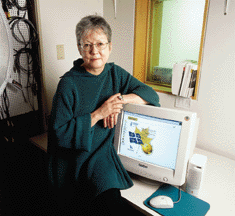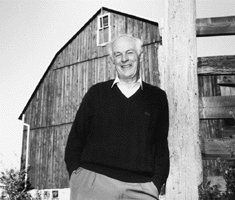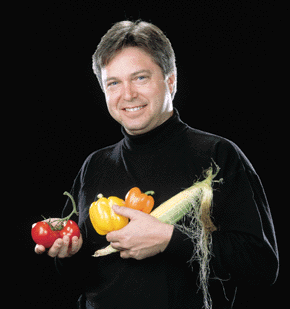
Enviropigs Will Reduce Farm Pollutants 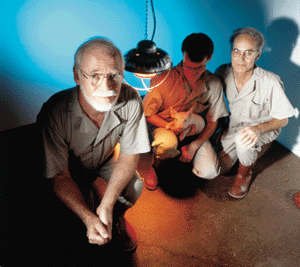
Microbiology doctoral student Serguei Golovan was burning the midnight oil on a research project led by Profs. Cecil Forsberg, Microbiology, and John Phillips, Molecular Biology and Genetics, when he found DNA evidence that a Yorkshire piglet born at U of G was the beginning of a new breed that could solve the biggest environmental problem facing hog farmers. Using genetic engineering, the two scientists had fused a bacterial gene into the pig embryo at the start of gestation, and Golovan verified its presence in the piglet's DNA. The gene will improve the pig's ability to digest natural plant phosphorus found in feed and reduce the amount of phosphorus released in its excrement. Phosphorus is a potential environmental problem if it washes into streams and lakes, where it promotes the growth of algae.
Whether you're in Africa, Australia or the Antarctic, it's still possible to stay connected to U of G through distance education courses as varied as fine art, food safety, soil science and family relations. You can even learn French in a reading course designed by Prof. Dana Paramskas of the School of Languages and Literatures. Her innovative class includes an original CD-ROM program that helps students build comprehension skills through exercises and interactive activities.
Retired physics professor Jim Stevens says undergraduate students often make big contributions to faculty research. Samantha Lee worked in his lab last year as a summer intern, testing ion conductivity in gels used in electrochromic devices that Prof. Stevens is developing for applications in automated highway signs, electronic display units used in supermarkets, and "smart windows" that automatically lighten or darken in buildings and automobiles.
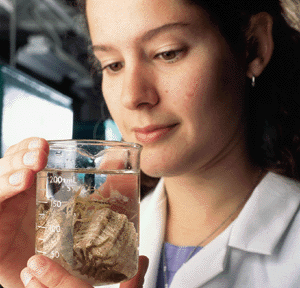 Preparing
students for the workplace
Preparing
students for the workplace
Guelph agriculture students often have three or four job offers when they graduate. The demand is the result of rapid growth in Ontario's second-largest industry and careful planning by the Ontario Agricultural College to prepare its students with the skills most needed by high-tech agribusiness. Four years ago, OAC introduced a revised undergraduate curriculum that places greater emphasis on workplace skills such as teamwork, effective listening, analytical thinking, effective management and communication. One of the highlights of the new curriculum is the World of Work skills development program, which uses techniques such as job shadowing, job placements, mentors and class modules to put students in touch with today's workplace realities.
Canada's four veterinary colleges bring their senior students together each summer to experience the role of the veterinarian in environmental issues. Rotating among Guelph, Saskatoon, Saint-Hyacinthe, Que., and Charlottetown, the ecosystem health program takes future vets into the field to address a specific ecosystem problem such as botulism in a freshwater marsh, oil spills or the relationship of toxins in water to tumours in whales. Pathobiology professor Bruce Hunter says vets play a significant role in the evolution and application of ecosystem health because of their expertise in comparative medicine, toxicology, epidemiology and wildlife diseases.
When humans take up long-term residence on another planet, they'll probably depend on plants to provide food and oxygen and on the expertise of scientists such as U of G plant agriculture professor Mike Dixon. He manages a nine-member research team that has received $2.4 million from the Canada Foundation for Innovation and is also supported by private industry and the U.S. National Aviation and Space Administration (NASA). NASA is encouraging experiments with plants grown in a sealed chamber similar to the system that might one day be used to support life on Mars. Prof. Dixon says this space-age interest is just one example of the diversity of Guelph programs in the agricultural sciences.
Back to Cover
